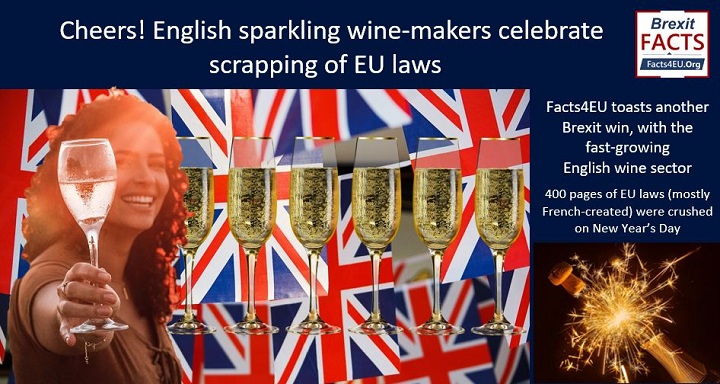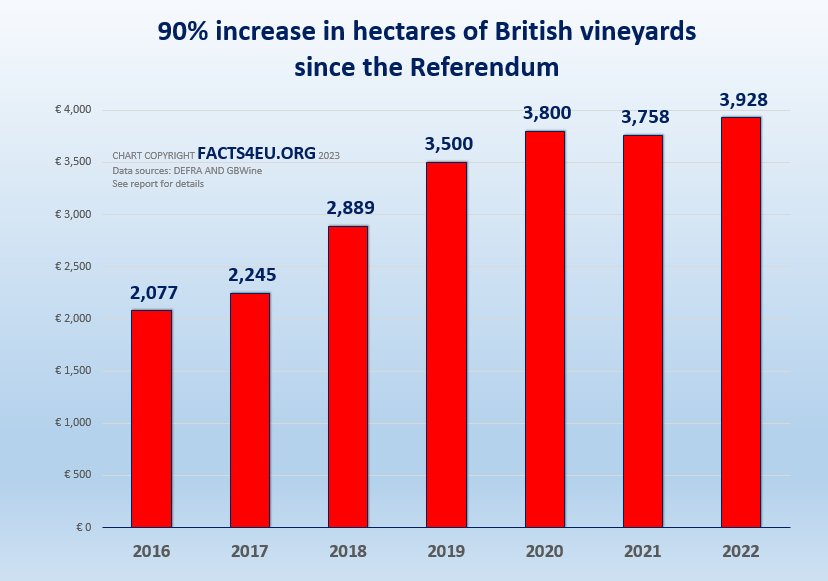Cheers! English sparkling wine-makers celebrate scrapping of EU laws

We toast another Brexit win, with the fast-growing English wine sector
400 pages of EU laws (mostly French-created) were crushed on New Year’s Day
On New Year’s Eve Environment Secretary Steve Barclay welcomed the scrapping of outdated EU rules in respect of the UK’s wine sector, inherited from Brussels over decades. The reforms made possible by Brexit will uncork innovation, encourage sustainable practices, and reduce burdens for businesses.
In addition to the UK’s long-standing status as a global wine trading hub, with a wine market worth over £11 billion in 2022, England and Wales have a fast-growing wine-making industry.
Summary
The booming wine sector in England and Wales
- On-trade and off-trade sales were worth £11.1 billion in 2022
- There are now almost 900 UK vineyards
- Hectares under vine in the UK have more than quadrupled since 2000
- Cultivation and harvesting of grapes is now Britain’s fastest-growing agricultural sector
- The sector employs around 2,300 people full time
- A further 8,300 are employed in part-time or seasonal work
- 50% growth in jobs predicted by 2025
[Source: DEFRA and GBWine.]
© Brexit Facts4EU.Org 2023 – click to enlarge
Bumper harvest in 2023
The trade association for Great British vineyard and wine producers, WineGB, reports 2023 is Great Britain’s largest-ever grape harvest, expected to produce an estimated 20-22m bottles. This represents an increase of over 50% on Britain’s previous record year in 2018.

Vineyard in the North Downs in South-East England
© Crown
Putting the fizz into Brexit Britain
Benefiting from perfect growing conditions in the south of England, English sparkling wine has seen a surge in popularity in recent years with 8.3 million bottles produced in 2022.
From Monday (01 January 2024), makers of English sparkling wine no longer have to use mushroom-shaped stoppers and foil covers on bottlenecks, giving producers the choice to opt for simpler packaging to reduce both waste and costs.
In a move welcomed by wine traders, the government will also remove the requirement for imported wines to have an importer address on the label, reducing administrative burdens for businesses.
Environment Secretary Steve Barclay said:

“Our departure from the EU gives us the opportunity to review and scrap outdated and burdensome rules that have been holding back our wine sector.
“The reforms we’re introducing will help our wine producers and traders become more profitable, dynamic, and sustainable – while freeing them from pointless red tape.
“Looking ahead to 2024, I’m committed to this government continuing to support our world-class wine-makers, vineyards and traders to grow and innovate.”
Nicola Bates, CEO of WineGB, the trade association for Great British vineyard and wine producers, said:

“We welcome the additional choice that comes from this first phase of actions from the wine reform consultation. There will be producers who are keen to take advantage of all and every option to reduce materials on bottles, so we can expect to see fewer foils on sparkling allowing you to celebrate that bit faster, and with an environmental benefit.
“We look forward to working with Government and the Defra team on future consultations, and am sure they will be as constructive as those now being implemented.”
The EU’s 400-page rulebook for wine – crushed
The reforms that came into force Monday (01 Jan 2024) follow last year’s ‘Wine: reforms to retained EU law consultation’ on the EU’s overly complex and bureaucratic 400-page rulebook for wine. The changes aim to facilitate international trade and foster domestic innovation and growth.
The UK wine market was worth over £11 billion in 2022 in off-trade and on-trade sales, and the UK’s developing domestic production sector has attracted significant global investment.
The UK is a global hub for wine. It is home to a diverse and dynamic wine sector and is the second largest importer of wine in the world by value. In 2022, off-trade sales of still, sparkling, and fortified wine via supermarkets, convenience stores, and specialist off-licences in the UK were worth around £7.6 billion, while on-trade sales through hospitality outlets were worth an estimated £3.5 billion.
The domestic wine-making sector in England and Wales might still be relatively small, but it is rapidly growing and developing a global reputation for quality. Production reports for 2022 show a 36% increase in production and there has been a 74% growth in hectarage of vines in just five years, between 2017 and 2022 (from 2,257ha to 3,928 ha).
Observations
The CIBUK team and the Brexit Facts4EU.Org team is happy to raise a glass this week to a fast-growing UK industry, finally freed from the shackles of stifling EU regulation. £11bn in wine sales is not to be quaffed lightly. The removal of many of the EU regulations holding it back are to be welcomed.
Please support our work:
The original report can be found here.
CIBUK thanks its Affiliated Organisation Brexit Facts4EU.Org for permission to republish this article.
Main image: Montage © Brexit Facts4EU.Org 2024






